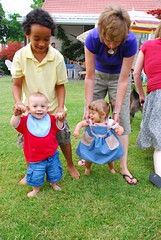Motor Development
A Brief Overview1
As we have seen in the Typical Motor Development section of this course, the development of motor skills follows a predictable sequence for most children. If there is a delay in the development of either gross or fine motor skills, a child needs to be seen by a specialist, usually an occupational therapist or physiotherapist, as early as possible.
Delays in motor development may also signal the presence of a condition related to the central nervous system. Immediate consultation with a physician is recommended to rule out any major condition.
- Motor skills are important because the development of other skills may depend on them. That is, delays in either gross or fine motor skills are likely to result in delays in other areas of development. Physical development may be affected in terms of muscle strength; this impacts the balance and control of the child’s body.
- Delays in the development of gross motor skills may adversely affect the child’s social/emotional development as the child may not feel as competent as his/her classmates during physical education and other daily motor activities (such as running for the bus or playing basketball).
- Delays in the development of fine motor skills may also adversely affect the child’s social/emotional development as the child may feel awkward because of the way he/she holds a pencil or uses a spoon.
- When children have high muscle tone, their muscles are tense; this is referred to as hypertonia (see full Glossary)
- When children have low muscle tone their muscles tend to be flabby; this is referred to as hypotonia (see full Glossary).
It is therefore important to be familiar with typical development milestones in the gross and fine motor domains, and to seek the help of a professional, if a delay is suspected.

0 comments
Kick things off by filling out the form below.
You must log in to post a comment.